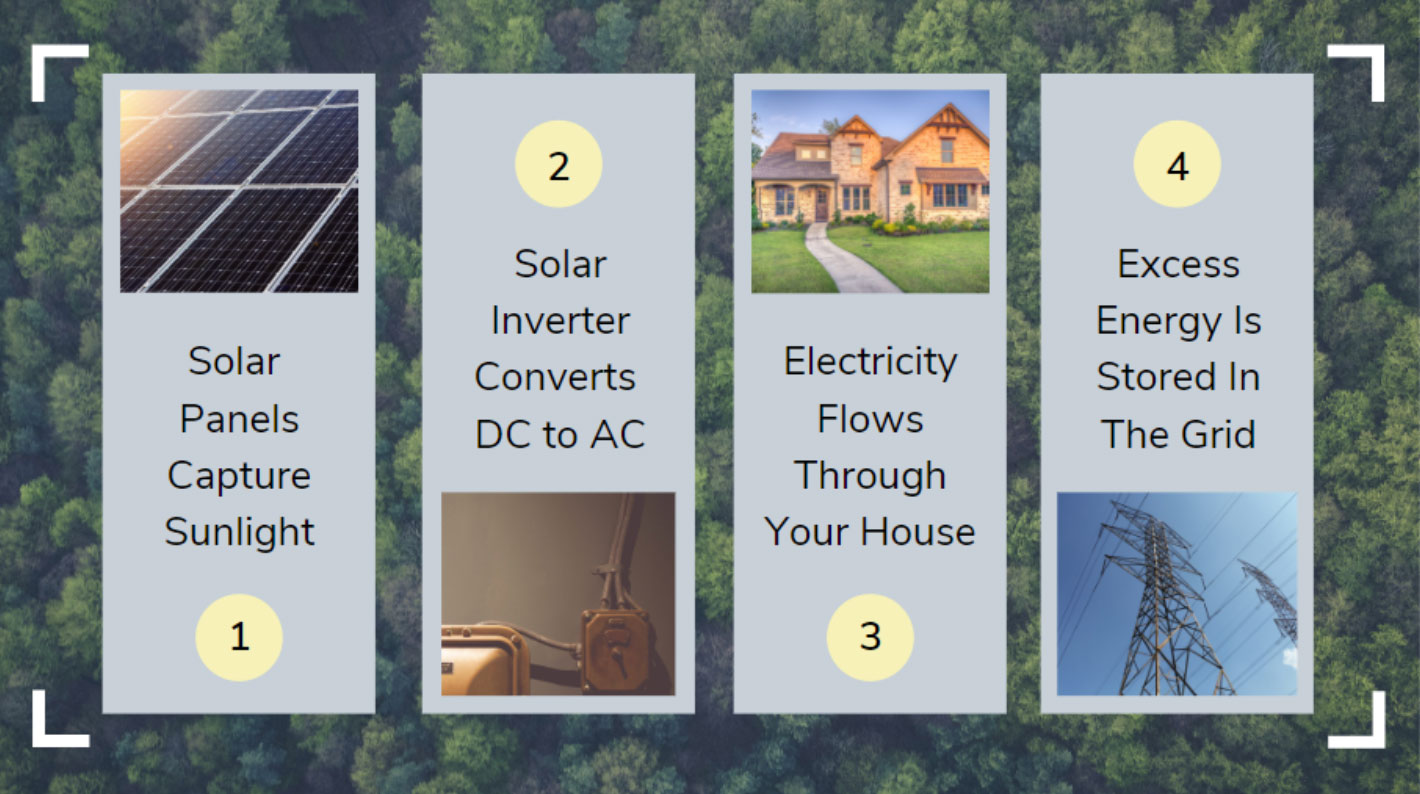Each year, as electricity costs rise and solar costs drop, more homeowners across the country turn to solar panel installation.
While the benefits of solar panels are tempting, getting started can be a daunting task. Solar is still fairly new, and many people don’t fully understand how solar energy works. Homeowners can’t confidently embrace the advantages of solar energy until they do.
So, before you get started, let’s answer an important question: How does solar energy work?
If you’re just beginning to consider solar panel installation, this is a great place to start.
Solar Energy Generation in Four Steps
1. Solar panels absorb light.
This occurs with the help of photovoltaic cells, which are composed of semiconductive material. Since this material contain properties of both conductors and insulators, it has unique capabilities.
Photons of light can transfer their energy to the electrons of the semiconductive material. This allows electrons to flow through it as electrical current.
2. A solar inverter converts DC electricity to AC electricity.
The direct current (DC) output generated by your solar panels will be converted to alternating current (AC) with the help of a solar inverter.
This is necessary because AC is a utility frequency that can be fed into the electrical grid or used by an off-grid electrical network.

3. Electricity flows through your house.
Once the energy is useable, it flows through your home, powering all of your devices.
Just like with the electricity provider you currently use, you never notice a thing. This process of electricity delivery is flawless.
4. Any excess electricity produced goes into the electric grid.
One of the main reasons you won’t notice the switch to solar is because you’ll probably have grid-connected solar, with access to net metering.
Solar panel efficiency varies daily. With net metering, you’ll receive bill credits each time you store excess energy in the electric grid. You can then use these credits to cover electricity from the grid when your home isn’t producing enough.
A utility meter will measure this exchange of electricity for you, so there’s nothing you need to keep track of.
Many people considering solar often ask, “Do solar panels work in the winter?” or “Do solar panels work at night?” Since solar panel efficiency is lower in these instances, net metering is a great solution.
How Much Energy Does A Solar Panel Produce?
Speaking of production concerns, how much energy does a solar panel produce?
As you might’ve guessed, this depends on a variety of conditions, but here’s the general answer:
An average solar panel array is around 5kW and 400 square feet, with each panel averaging 250 watts and 20 square feet. This array could produce around 350-850 kWh of energy each month. Since most households use around 897 kWh each month, a single solar panel typically covers 1/20th of your needs, which is why most arrays include 10-20 panels.
The size of your roof will determine the extent of your solar panel production. Your energy usage will also play a role in determining the amount you’ll need to generate.
Also, keep in mind that your solar panel efficiency depends largely on the type of solar panels you install. You have options between monocrystalline and polycrystalline panels. Monocrystalline panels are more efficient, but also more expensive. Your choice will depend largely on the amount of sunlight your roof gets and the climate you live in.
Also, you’ll need to decide if you want an average or large size system. If you're comparing between a 4kW solar system or an 8kW solar system, the price tags are very different. The choice will depend on your situation and how much electricity you need to generate.
Other factors that contribute to how much energy a solar panel produces include technology, location, angle, and climate. Check out our free resources to learn more and get started finding the perfect fit for your home.
Once you have an idea of the level of solar panel efficiency you’ll need, you can compare your options with free quotes.
Get started enjoying the benefits of solar panels today.